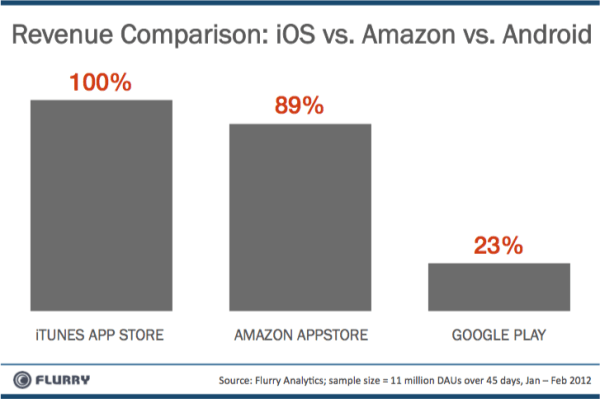
According to new data released today by mobile analytics firm Flurry, Amazon’s Appstore for Android is generating more revenue per daily user than the Google Android Market, which was recently rebranded as the Google Play store. That shouldn’t be surprising, given that Amazon vets apps for quality, runs promotions to entice users to return daily, and perhaps most importantly, is able to leverage its established user base of Amazon account holders who already have credit card information on file – perfect for one-click checkouts.
To generate its figures, Flurry examined a set of top-ranked apps that have a presence on all three stores: Apple, Amazon and Google Play. Combined, the apps average 11 million daily active users.
Flurry set the revenue generated in the iTunes App Store to 100%, then compared the relative revenue generated by Amazon and Google to that of the App Store. In doing so, the firm found that Amazon revenue is 89% of App Store revenue and Google revenue is 23% of App Store revenue. Or, in other words, for every dollar an iOS app makes, it generates 89 cents in the Amazon Appstore and 23 cents in Google Play.
The findings back up Flurry’s December report, which found the Android Market to generate 23 cents of revenue for every dollar generated by iTunes.
Flurry cites Amazon’s online retail prowess as reason for its success. “Amazon, who invented the one-click purchase, perfected online shopping with data, efficiency, and customer service,” says Flurry’s VP of Marketing Peter Farago. Meanwhile, running a store – whether digital or retail – is not one of Google’s core competencies, he notes.
The data speaks to Amazon’s potential (or really, its place) as a viable third ecosystem for developers looking to generate revenue, which leaves one wondering where the Microsoft/Nokia ecosystem will fit in. Can the mobile app ecosystem support it as a strong fourth player one day, too?
Farago tells us that Flurry believes it can. “We believe that Microsoft + Nokia have a lot of the key assets to succeed, from a powerful OS, hardware know-how and, most importantly, building robust third party developer support. We are bullish on their progress,” he says.
He also suggests that Amazon’s success may leave other players considering similar tactics – that is, forking Android to build their own Android-flavored OS and associated app store.
Samsung, specifically, is called out as one company that might see this path as appealing. Farago explains that most OEMs want to differentiate their software, if for no other reason than to please carriers which want unique phones.
“Software is the easiest way to achieve this,” he says. “If all hardware makers have the same software, then differentiation drops.”
With Amazon’s growth as a revenue generator for developers as well as a new hardware competitor, Flurry thinks Samsung may be considering its own Android fork.
“If you put together the idea that OEMs want differentiation and Amazon is now competing strongly against Samsung in the tablet category, as well as its ability to make revenue for developers, then a fork for Samsung becomes a real strategic choice to consider,” Farago explains. “Let’s also not forget that apps will soon be on TVs, where Samsung already has a strong footprint in hardware. Finally, Samsung has Bada. If they haven’t switched to that already, then it’s because Android is working for them well enough, until possibly now. If that’s the case, a fork of Android again looks like an alternative to evaluate.”
Source: Techcrunch
Aucun commentaire:
Enregistrer un commentaire